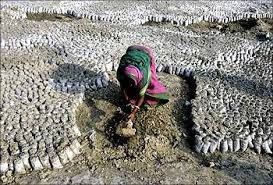The US said it intends to achieve an economy-wide target of reducing its emissions by 26-28 per cent below its 2005 level in 2025 and to make best efforts to reduce its emissions by 28 per cent.
 Following ambitious pledges by US and China to reduce emissions, UN chief Ban Ki-moon said it is ‘not fair’ for all countries to make the same level of contributions, given their different phases of development and needs, a stand similar to that of India.
Following ambitious pledges by US and China to reduce emissions, UN chief Ban Ki-moon said it is ‘not fair’ for all countries to make the same level of contributions, given their different phases of development and needs, a stand similar to that of India.
"It is clear that every country has to act in accordance with its own national circumstances and level of development.
“No country can dictate to another sovereign country. But climate change is a global challenge that requires a coordinated global approach. All countries must play their part," the Secretary General told PTI.
Last month, the US and China announced a significant deal setting limits on greenhouse gases.
The US said it intends to achieve an economy-wide target of reducing its emissions by 26-28 per cent below its 2005 level in 2025 and to make best efforts to reduce its emissions by 28 per cent.
China hopes to achieve the peaking of CO2 emissions around 2030 and to make best efforts to peak early and intends to increase the share of non-fossil fuels in primary energy consumption to around 20 per cent by 2030.
While Prime Minister Narendra Modi has voiced his commitment to environmental issues, India has stressed that the country will take action on climate change on its own volition.
On whether it is fair to expect the same level of contributions from India as those promised by the US and China, which have been on of the biggest emitters, Ban said it is unfair to expect same commitments on reducing emissions from all countries.
"It is not fair for all countries to contribute the same -- countries face different circumstances, are in differing phases of development, and have different capacities and needs.
“But every country needs to do what it can. This is an investment in our collective future," he said.
"It is in everyone's self-interest to take action.
“All countries -- and people -- will win if we act.
“Everyone loses if we do not -- especially the world’s poorest and most vulnerable," he added.
India has also made a strong pitch for focusing on adaptation and common but differentiated responsibilities as part of the new global order on climate change, saying it cannot only be about mitigation and emission cuts.
Ban said it is ‘absolutely true’ that that the adaptation and resilience agenda has not received the attention or financing that is needed.
"Climate change is already happening, and countries and communities in developing countries need the assistance to build climate resilient economies," he said.
A number of initiatives were launched at the UN Chief's Climate Summit in September to expand access to insurance for people in vulnerable communities and to promote disaster reduction measures.
"But we need to do much more on adaptation.
“I will see to it that the UN expands its work on the adaptation agenda.
“The commitments countries will place in the new agreement will be self-determined and not imposed by anyone.
"Countries will determine what future actions they can take consistent with their own national circumstances and global responsibilities," he said.
On the role of intellectual property in climate negotiations, Ban said, "We will have to see how many issues are resolved in the draft elements for the agreement that will emerge in Lima.
"Intellectual property, technology transfer, and financing are among a wide range of topics that must be addressed in the context of climate change and sustainable development," he said.










